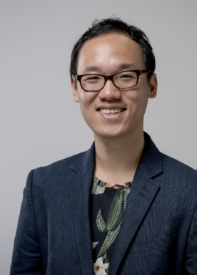- Roslyn High School
- Alumni Corner
-
Yena Kim (RHS 2017)

Current job title:
Joint-PhD Student in Cognitive Psychology and Behavioral Science at the University of Chicago Booth School of Business
Job description:
I'm a doctoral student mainly working with Drs. Emma Levine and Howard Nusbaum. My research focuses on the psychology of personal change. As creatures of habit, people often struggle with revising old ways of thinking and doing, no matter how beneficial change may be. Thus, how can we inspire people to fulfill their potential? What is the role of honest communication in encouraging others to improve going forward, especially after facing failure? Using qualitative and experimental methods, both in-lab and out in the field, I study the social-cognitive factors underlying aspirations to improve oneself.
Recent publication:
Kim, Y., Nusbaum, H. C., & Yang, F. (2023). Going beyond ourselves: the role of self-transcendent experiences in wisdom. Cognition and Emotion, 37, 98–116. https://doi.org/10.1080/02699931.2022.2149473
Thoughts on the RHS Research Program:
Thanks to the Research Program and Dr. Weseley's mentorship, I was lucky enough to find my passions early on in life. I still use everything I learned in high school, from designing experiments to presenting my work to diverse audiences. My mind is full of my personal observations of human quirks and future study ideas. My research skills have helped me make use of my curiosity all throughout college and beyond. Research has always been a source of fun and creativity for me. Going forward, I hope to share that joy with others through my work and teaching.

Kevin Xu (RHS 2010).
Current job title: Faculty, Washington University in Saint Louis
Job description:
I am a pharmaco-epidemiologist and addiction doctor studying drugs, reproductive health, and psychiatric policy . Pharmaco-epi is a fancy name for data science research on drugs and medications. In pharmaco-epi, we use giant amounts of deidentified patient data procured from pharmacies and insurance companies, which sell patients’ deidentified claims to universities, non-profits, consulting firms, etc. Using these giant datasets, we can simulate clinical trials and study treatment outcomes in minoritized communities which are otherwise difficult to reach via traditional human subjects research. Long story short, pharmaco-epi data presents a powerful alternative to the expensive and time-consuming process of recruiting human subjects.
I joined the Wash U faculty in 2022 , recently jumped onto the tenure track, and lead a small but growing NIH-funded group. I am lucky to have a dynamic life. I travel a lot for meetings to go over data with policy experts and often review manuscripts for various journals. I direct the addiction psychiatry clinical rotation at Wash U, where I see patients with med students/ residents and oversee training in med management and clinical evaluations. Most of the time, though, I am poring through statistical code, writing/editing manuscripts, and working on grants. There’s overall never a boring moment!
Recent publications:
Xu KY, Jones HE, Schiff DM, Martin CE, Kelly JC, Carter EB, Bierut LJ, Grucza RA. Medication Initiation and Treatment Discontinuation in Pregnant Compared With Nonpregnant People. Obstetrics & Gynecology. 2023 Apr 1;141(4):845-853. PMCID: PMC10201921.
Ellis MS*, Xu KY*, Tardelli VS, Fidalgo TM, Buttram ME, Grucza RA. Gabapentin and Drug-Related Overdoses in the United States (2006-2016). JAMA Psychiatry. 2023 Sep 6;e233145. PMCID: PMC10483381. (*=denoting equal contribution.)
Martin CE, Patel H, Dzierewski J, Moeller G, Bierut LJ, Grucza RA, Xu KY. Benzodiazepine, Z-Drug and Sleep Medication Prescriptions in Male and Female People with Opioid Use Disorder on Buprenorphine and Comorbid Insomnia: An Analysis of Multi-State Insurance Claims. 2023. Sleep. 2023 Jun 13;46(6):zsad083. PMCID: PMC10262036.
Thoughts on the RHS Research Program:
Dr. Weseley remains the prototype in my mind for what a great mentor should be. There are tons of people who taught me fancy statistical models and research methods in college and grad school, but few mentors like Dr. Weseley went out of their way to be a role model on personal development. It probably helped that my mind was malleable and pluripotent as a teenager in high school, as the things Dr. Weseley taught me about work ethic, grit, coping with rejection, and communication ended up sticking years later.
Michael Cervia (RHS 2012)
Current job title:Post-doctoral scientist in the Departments of Physics at University of Maryland, College Park and George Washington UniversityJob description:I am a researcher collaborating with a handful of different groups scattered around the world. Recently, my work theorizes how collective interactions within atomic nuclei and among elementary particles can form quantum entanglement as well as how we can use quantum computers to answer questions in theoretical physics and other sciences. Recently, my research has considered, for example, what effects of entanglement we could see when we observe the aftermath of a supernova and, equipped with noisy or robust quantum computing, how we could simulate physics or solve mathematical problems more efficiently. You will typically catch me at my job with pen and paper, coding simulations to run on supercomputers, or enthusiastically chatting with colleagues in a brainstorming session.Recent publications:E. M. Murairi and M. J. Cervia. “Reducing circuit depth with qubitwise diagonalization” Phys. Rev. A [accepted, in production] (2023). https://arxiv.org/abs/2306.00170… or you can find all my published manuscripts here: https://inspirehep.net/authors/1880890Thoughts on the RHS Research Program:While I was in the program, I studied behavioral science and later immunology. That time gave me an early appreciation for those topics, and, in my recent life as a physicist and instructor, the skills I picked up from the program—and the dedication with which Dr. Weseley taught me to sharpen them—help me every day. Synthesizing peer-reviewed literature, understanding the scientific method, and communicating my ideas precisely and confidently have enriched my work and personal life alike. As I transition into a mentorship role leading students in research of my own, I have a model to look back upon and a gold standard for what a rigorous research program would look like.

